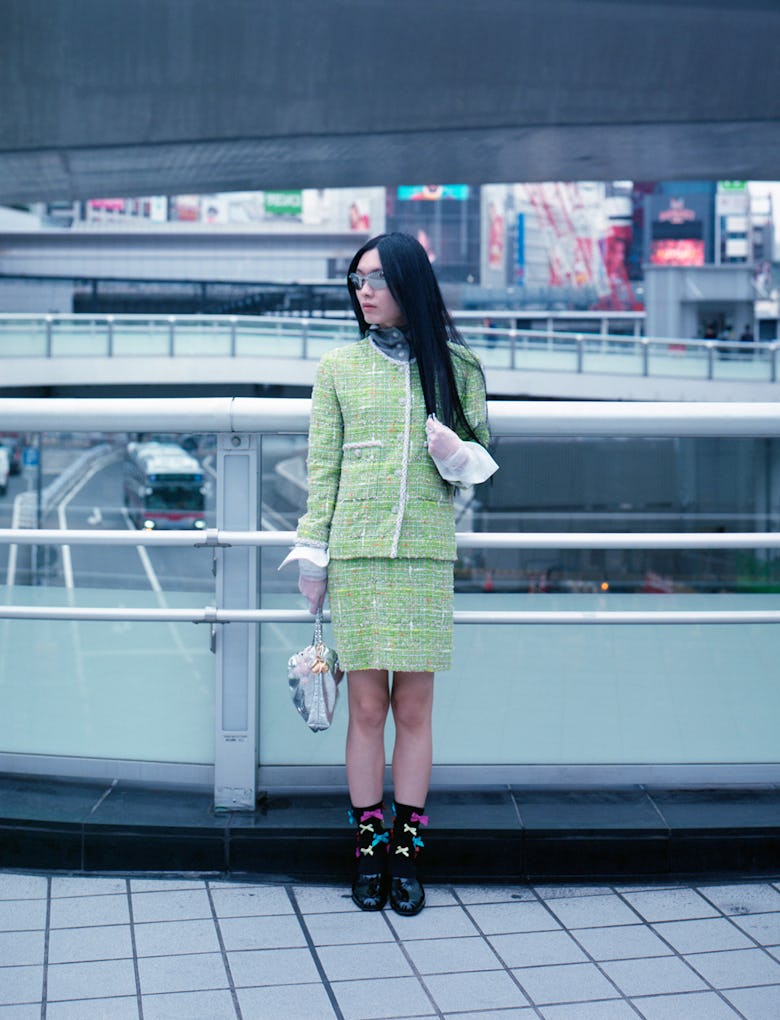The noon sky is overcast on another muggy day during Tokyo’s long late summer, and the crew for today’s shoot is snaking at a brisk pace through the packed streets of Shibuya neighborhood in single file, struggling to keep up with the boss: the sprightly photographer Takashi Homma. They easily spot him within the human crush of tourists and workers on their lunch break thanks to his bright white baseball hat, perched atop a full head of white hair. Homma zips along the streets, miraculously finding empty spots to set up his clunky tripod and old-timey Linhof medium-format camera. A guerilla production with a handheld digital camera might have seemed a lot less burdensome, but Homma assures me, “It’s easier to do it this way. When you’re snapping away on a digital camera, you actually stick out more. I hate taking multiple shots. I like to conserve.”
Homma is famed for his raw yet seductive style and the way he finds unexpected beauty in the pedestrian and mundane. He became interested in photography at the end of high school, after quitting the baseball team; he then went to art school and eventually started his career in the advertising industry. During the 1980s, when the explosion of nouveau riche taste pushed Japanese art and design toward all things glossy and gaudy, Homma headed the opposite way, focusing on gritty street snapshots.
Chanel jacket, skirt, gloves, bag, and shoes; Swarovski sunglasses; Susan Alexandra bag charm; Happy Socks socks.
Gucci belted jacket, coat, and shoes; Susan Alexandra bag; stylist’s own socks.
His first subjects were zanily dressed indie girls that he found for the fashion magazine CUTiE. “I was shooting for the big advertising companies at the time, and my peers couldn’t believe I’d do such magazine work,” he says. “But the editor there gave me freedom to do what I wanted.” In 1991, he moved to London and collaborated with the British street culture mags at the peak of their influence. “Terry Jones from i-D told me, ‘You should shoot straight up,’ and that’s been in my head ever since. Photography is a lot like sushi—it’s always better when you don’t overcomplicate it.”
By the late 1990s, Homma had entered the realm of fine art. His masterful book Tokyo Suburbia captured the banality and isolation of Japanese middle-class life during the long recession that followed the go-go ’80s. Homma says local critics were confused. “They wondered, what is interesting about this? Are these flyers for a real estate company?” Foreign curators, by contrast, immediately sensed the deeper meaning in his images. His inclusion in overseas exhibitions made him into an international star.
For this project, Homma was inspired by the fact that it was stylist Charlotte Collet’s first-ever trip to Japan. The locations for the pictures you see here were selected based on Tokyo tourism clichés: inside a Cerulean Tower hotel room with a view of the sprawling cityscape; in front of a convenience store advertising its freshly fried doughnuts; in the middle of the well-known Shibuya Scramble Crossing. Homma says he enjoys trawling Tokyo’s most overdeveloped areas because of their “fragility”—buildings are here one day, gone the next. The shoot went off without a hitch, a testament to Homma’s enduring ability to capture still moments amid urban chaos. But it also says a lot about Tokyo, a megalopolis that manages to balance cutting-edge modernity with a calming sense of safety. “If I was a foreigner,” says Homma, “I’d want to live in Japan too.”
Louis Vuitton coat, sunglasses, bag, and boots; Jellycat bag charm; stylist’s own shirt and tie.
Hermès coat, turtleneck, bag, bag charm, scarves, and sandals; stylist’s own shirt and socks.
Valentino coat, blouse, skirt, and socks; Valentino Garavani shoes.
Prada coat, bag, bag charms, and shoes; Miu Miu sunglasses and socks.
Bally coat, bag, and shoes; Susan Alexandra bag; Emilio Cavallini socks.
Dior coat, top, skirt, and shoes; stylist’s own socks.
Raiki Yamamoto wears a Brunello Cucinelli jacket and skirt; Bally bag; Celine by Hedi Slimane scarf and mittens; String Ting bag charm; Emilio Cavallini socks; 13 09 SR boots; stylist’s own shirt.
Max Mara dress, shorts, and hat; Marni shirt; Super Smalls hair clips; Emilio Cavallini socks.
Hair by Hayate Maeda. Model: Raiki Yamamoto.
Producer: Souta Kasahara; Photography assistants: Souta Kasahara, Reina Kubota, Jun Asami; Fashion assistants: Ai Takahashi, Emilie Carlach; Hair Assistant: Ren Kato.

